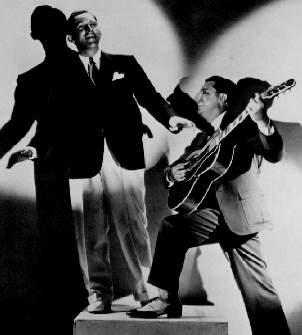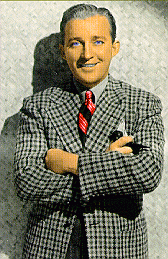

More than any entertainer,
he epitomized during the
Depression and World War II
the highest hopes of Americans.
Crosby was a singer: the archetypical "groaner" who made 850 recordings -- including White Christmas, at almost 40 million copies the best-selling single of all time. He was a movie actor: his "Road" pictures with Bob Hope are classics of comedy, his serious roles in Going My Way and The Country Girl earned him Academy Award recognition. He was a family man: after raising four children with first wife Dixie Lee, he started all over again with Kathryn Grant, 30 years his junior, and produced three more. He played golf, sold instant orange juice and made millions in a career that proved that being casual had its own rewards.
Harry Lillis: He was, however, first and always a singer, even back in Spokane, Wash., where his family had moved from Tacoma. Bing was born on May 2, 1904, and christened Harry Lillis, the fourth of seven children, another of whom, younger brother Bob, became bandleader of the famous Bob Cats. By his own account, Bing got his nickname from a favorite comic strip called "The Bingville Bugle." According to Bing's father, interviewed after his son became famous, Bing sang even while at Gonzaga University. Was he any good? "Oh, he was all right -- about like he is now," replied Crosby senior.

But Bing's musical education really began after he abandoned Gonzaga and joined Paul Whiteman's Band in 1927, becoming one of the Rhythm Boys. He hung around with Eddie Condon and Jimmy McPartland and roomed for awhile with the immortal Bix Beiderbecke. "The taught me how to sing," he has said. He never lost these jazz roots, that swinging style, the masterly way with rhythm, the natural phrasing that made his singing sound improvised. That and his mellifluous baritone, with the texture of velvet, the color of mahogany and the resonance like a built-in echo chamber, were tailor-made for crooning. Dinah Shore said, "Bing sings like all people think they sing in the shower."
But Bing was lucky, too. The times were made for him. He came along at the dawn of microphones, amplification, radio and talking movies, all ready for his soothing crooning style. Starting in the '30s, Bing had his own radio programs on all three networks, most notably the Kraft Music Hall, which paid him $7,500 for each show. His theme song was, of course, Where the Blue of the Night Meets the Gold of the Day (bu-bu-bu-boo), but hits were just as much his specialty. Between 1931 and 1957 he made those 850 records and sold more than 300 million copies -- a million each of at least twenty songs, among them "Silent Night," "White Christmas," Don't Fence Me In and Sweet Leilani.
A good number of Crosby hits, such as "White Christmas" from "Holiday Inn" and Swinging on a Star from "Going My Way," were brand-new songs introduced by him in movies. In all, he made about 70 movies including "Pennies from Heaven," "She Loves Me Not," in which he sang Love in Bloom, and, with Frank Sinatra, "High Society," which featured the song True Love.
But just as Bing's singing developed into a style as comfortable as a pair of well-worn slippers, his screen image grew beyond the absent-minded professor of his first starring role, in "College of Humor" (1933). He began to exhibit a natural gift for comedy in his "Road" shows with Bob Hope and Dorothy Lamour, beginning in 1940 with "The Road to Singapore." Crosby's death ended the plan for anew "Road" show -- "Road to the Fountain of Youth."
Unassuming, diffident, Bing crept up on the audience -- and himself -- as an actor. With Ingrid Bergman in "Bells of St. Mary's" and Barry Fitzgerald in "Going My Way," Catholic Bing made so convincing a priest that the latter movie won him the Academy Award. Accepting, he said, "This is the only country in the world where an old broken-down crooner can win an Oscar for acting." but he got better and better, convincing in "Little Boy Lost," deeply moving in "Man on Fire" and unforgettable as the broken-down alcoholic actor in "The Country Girl" with Grace Kelly.
Hit Song: Unquestionably, Crosby came to mean more to America than his considerable talents suggested. More than any entertainer, he epitomized during the Depression and World War II the highest hopes of Americans. He was clearly not a stiff-upper-lipped English man or an intense, intellectual French man or an emotional Italian. He was casual and carefree, personifying the hopes that the Depression would end that peace and victory would come: his hit song Accentuate the Positive summed up the hopes of all.
He was very rich -- which no one resented. He didn't flaunt it and he gave a lot away, to his old school Gonzaga, to poor kids in London's East End, to various charities through what came to be called the Crosby Annual Clambake, the 40-year-old Bing Crosby National Pro-Am golf tournament in Pebble Beach, Calif. His financial empire at one time or another included pieces of the Pittsburgh Pirates and the Detroit Tigers, 25,000-acre Nevada cattle ranch, a trailer village in Palm Springs, Calif., a TV production company whose properties numbered "Ben Casey" and "Hogan's Heroes,"and a racing stable. His horse adopted Bing's style -- slow and easy. But his fortune, estimated at between $40 and $70 million, prompted his pal Bob Hope to say, "Bing doesn't pay income tax any more. He just asks the government what they need."
Three-foot Putt: Out of public view Bing's life was less carefree. He used to drink considerably. "I never missed a show," he said recently. "But there are some I should have skipped." His first marriage was turbulent and relations with his sons were troubled. But he apparently retained his equanimity. "I'm low-key," he said. "Missing a 3-foot-putt sometimes irritates me." He always claimed to prefer playing golf or fishing and hunting to performing. "I've stretch a talent which is so thing that it's almost transparent over quite an unbelievable term of years," he once said.
But however much he wouldn't or couldn't recognize it, a great and important presence has departed. He embodied America's aspirations to be carefree, secure and graceful. And when, half joking, he asked that his epitaph read: "He was an average guy who could carry a tune," we understood that he spoke for all of us.